From the most censored site on Facebook. It is impossible to share articles from VT in any shape or form, EVER.
Whatever I do something always "goes wrong" - ALWAYS.

VT
Italia: US Missile Destroyers in Gulf
17 May, 2019
___di Fabio Giuseppe Carlo Carisio per VT Italia
“Armand Dive begins after Ramadan”. This is the main news yesterday evening on the website of the Iranian news agency Tasnim in the Persian version in reference to the agreement between Iran and Iraq for the dredging of the Shatt al-Arab river, a waterway where Tigers gather and Euphrates before flowing into the Indian Ocean, a crucial point for tanker traffic. The transit was interrupted years ago during the war between the two countries and the lack of cleaning of the riverbed obstructed besides by alluvial debris also from the carcasses of the sunken ships affixed to block the maritime outlet.
And at the mouth of Arvand the construction of marine oil platforms began in synergy between a Russian and an Iranian company controlled by the government.It is from here that many important projects on black gold are developed. And this is the real reason for the winds of war that blow from the US: a triple alliance between Russia-Iran-Iraq with the addition of Syria, a long-time ally of Moscow, would cut off Washington from much of the Middle Eastern crude market.
In this exasperated climate the escalation of the conflict in Yemen is triggered where the capital Sana’a was bombed by the Saudis in retaliation against an attack on its oil plants by the drones of the Houti revolutionaries.In this exasperated climate the escalation of the conflict in Yemen is triggered where the capital Sana’a was bombed by the Saudis in retaliation against an attack on its oil plants by the drones of the Houti revolutionaries.
In this exasperated climate the escalation of the conflict in Yemen is triggered where the capital Sana’a was bombed by the Saudis in retaliation against an attack on its oil plants by the drones of the Houti revolutionaries.
Behind these projects on Arvand lies the “haste” that prompted the White House national security consultant, Jonh Bolton, to blow tensions against Iran to convince US President Donald Trump, now a puppet of fraudulent warmongering advisers , to intensify military pressure in the Persian Gulf.
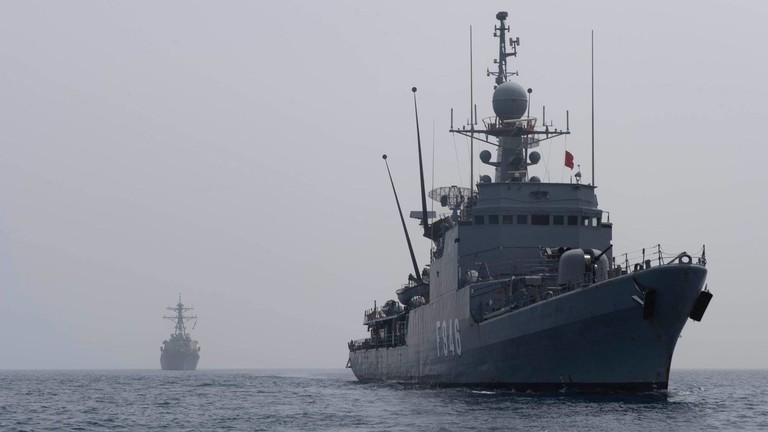
As reported by the Russia Today network yesterday, Thursday 16 May, two USS Gonzalez (DDG-66) and USS McFaul (DDG-74) missile destroyers passed the Strait of Hormuz to reach the Abraham Lincoln aircraft carrier (CVN- 72) and the amphibious vessel Kearsarge (LHD-3), respectively deployed off the coast of Oman and the United Arab Emirates, not far from the base of the Fifth Fleet Us Navy, in the port of Manama, Bahrain. The two ships are armed with the powerful Tomahawks, the cruise missiles with a range of about 2 km already used by Trump in Syria in April 2018 in response to Douma’s chemical attack, later revealed as an invention by the British White Helmets.
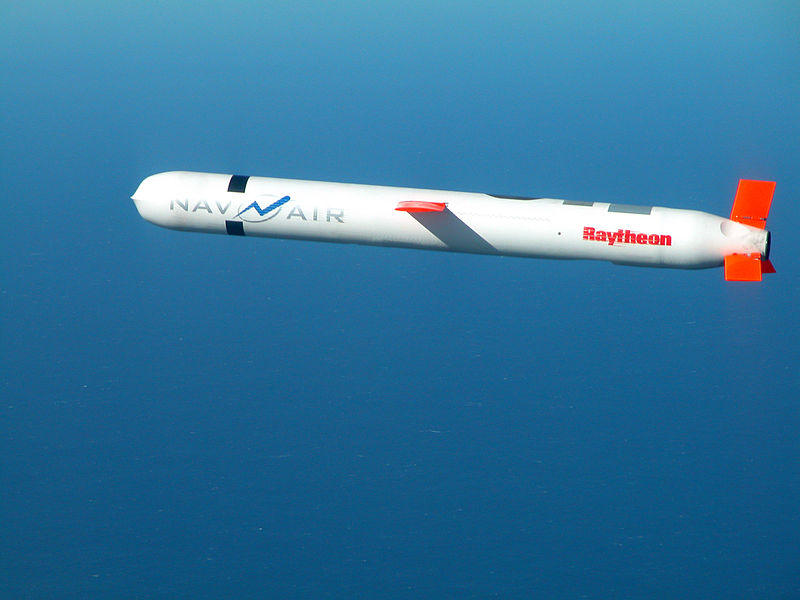
Just as against the Damascus, the US military could use as a pretext some incidents that occurred in recent days to unleash a retaliation that, as reported by the Qatari network Al Jazeera, citing a Saudi media, could be “surgical” like that conducted on Syrian soil in the comparisons of the positions of the Lebanese Hezbollah and of the Iranian Quds, both of Islamic Shiite confession and therefore historical enemies of the Kingdom of Saudi Arabia, theocratic monarchy of Wahabite-Sunni inspiration.
In practice the conflict that is tearing apart Yemen and sees the ethnic Houti Shiite religious minority opposed to the government of Rabbu Mansour Hadi supported by the Saudi Royals along with their hidden allied Al Qaeda Sunni jihadists could explode throughout the Persian Gulf with support military service of the Americans.The concerns of the US generals of the Africom in the Camp Lemonnier base in Djibouti have always been those of having at 30 km as the crow flies the Yemeni coasts occupied by the pro-Iranian Houti and therefore have supported the Saudis with military aid in arms and ammunition, officially interrupted only after the decision of the US Congress for the murder of journalist Jamal Kashoggi, columnist of the Washington Post, in the consulate of Arabia in Istanbul. While facing the coasts of Iran the US military can rely not only on Fifth Fleet ships but also on the basis of US Air Force of Udeid, instead, two B-52 bombers were transported ready for any eventuality.
BOMBARDMENTS BETWEEN HOUSES AND SAUDI: ENHANCEMENT MASSACRE
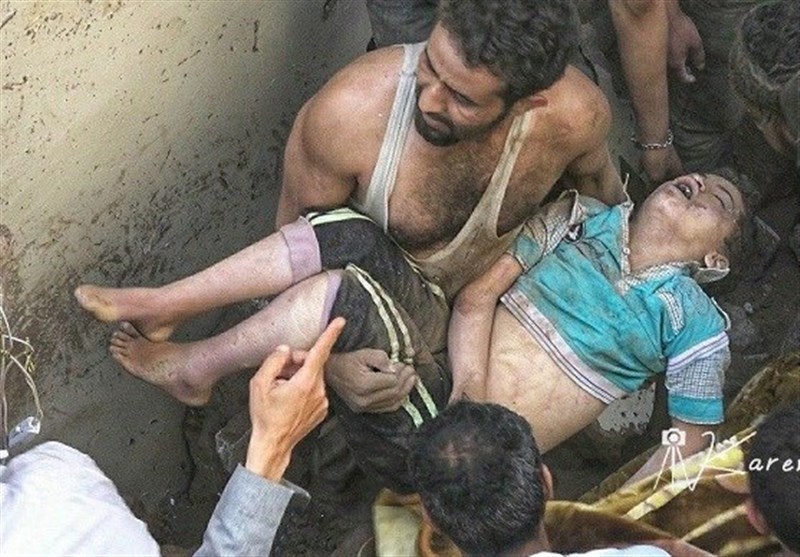
The tensions between Tehran and the White House are officially consequent to the withdrawal of the US in 2018 from the JCPA (Joint Comprehensive Plan of Action), the agreement on nuclear disarmament, from which Iran later withdrew. The escalation is also justified in the mutual attacks in the Yemen war between Houti and Saudi Arabia: the Shiites, who claim the autonomy of the region around San’a in a conflict claimed the lives of tens of thousands of civilians and hundreds of children starved to death in recent days, they hit several refineries in the suburbs of Ryadh and an oil pipeline with rockets from various drones. Immediate response of the Saudis against the capital Sana’a targeted by a massive bombardment of residential areas in which 6 people, including women and children, would have died.and two Russian citizens were also injured: a retaliation against civilians which immediately aroused the indignation of many Arab politicians.
Although the Houtis have assumed public statements, all responsibility for the attack “in response to Saudi crimes” has pointed the finger at Iran, even accusing it of the alleged sabotage of four oil tankers in the port of Fujairah, in the United Arab Emirates. Regarding these incidents, however, only the image of the Norwegian tanker Andrea Victory was spread, damaged on the waterline with a flaw more similar to the consequence of a collision than an explosion.
In this climate of tensions, any pretext, just like the fake chemical attacks in Syria, can become an opportunity for the US to start bombing, triggering the Third Gulf War, as it is unlikely that the Tehran Islamic Revolutionary Guards armydeclared terrorist organizations by Washington, will accept to come to terms under threats or worse still force.
US Secretary of State Mike Pompeo continues to repeat to the media that “Our goal is not war”. But the massing of warships, the deployment of B-52 bombers, the refueling of ground-to-air Patriot missiles for land-based anti-aircraft missions and now the arrival of Tomahawk rocket launchers seem to support the opposite view. Like the diplomatic maneuvers: on Wednesday, the State Department ordered the evacuation of non-essential personnel from the US embassy in Baghdad and from the consulate in Erbil.
IRAN: «THE USA ATTACK IS A SUICIDE ACT»
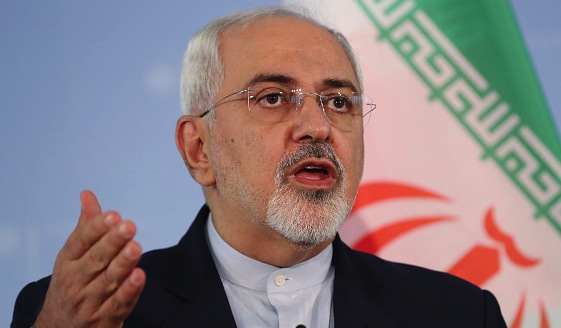
That is precisely why Iranian Foreign Minister Javad Zarif is touring Asia to explain to other nations the reasons for Tehran’s withdrawal from the JCPA treaty. After being in the ally Russia was in Japan and is now in China repeating to all government representatives that Iran is opposed to an escalation but accusing the US of instigating “an unacceptable maximum pressure on the Islamic Republic” as reports Al Jazeera, adding another eloquent comment by Zarif “it is a suicide act. If they act they will not like the answer “.
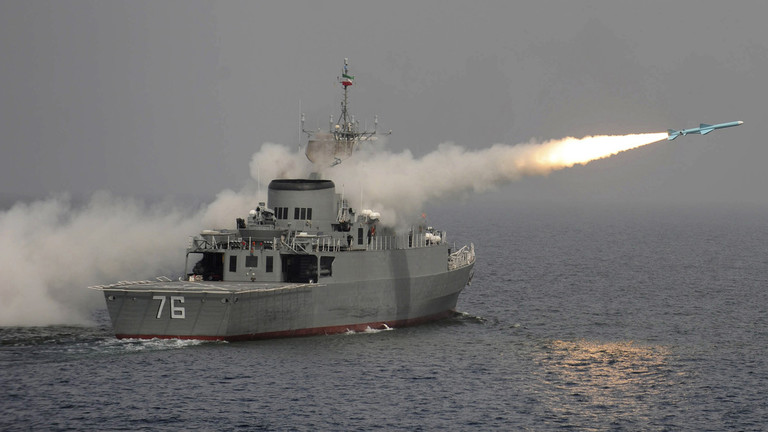
“The foreign minister of Qatar, Sheikh Mohammed bin Abdulrahman Al Thani, met his Iranian counterpart in recent days in Tehran in an attempt to defuse the situation,” Al Jazeera reports again, having its headquarters in Qatar, a prosperous nation and investor in West, there is concern about a conflict in which this same Arab country could suffer heavy collateral damage. And the red alert in the Persian Gulf also derives from the publication of an article that is as detailed as it is disturbing: “Arab News has published an editorial which has claimed that after the attacks earlier this week against Saudi energy targets, made by the rebels Houthi operating in neighboring Yemen supported by Iran, the next logical step for the United States “should be surgical attacks”,without going into what specific targets should be hit. The editorial added that it was “clear” that US sanctions “had not sent the right message” to the Islamic Republic, adding: “They must be hit hard” “.
IRANIAN OIL IN CHINA DESPITE SANCTIONS
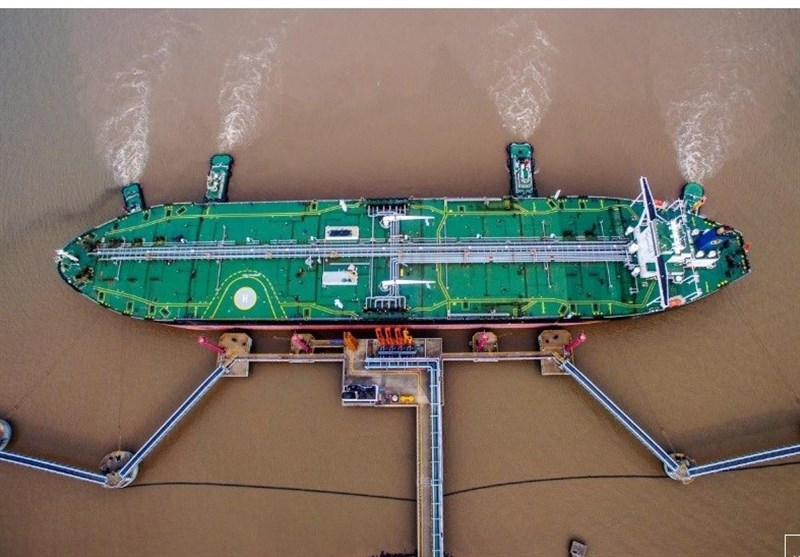
It is still the Iranian agency Tasnim to publish a photo of an Iranian oil tanker while with Iranian crude oil in a Chinese port although this is contrary to US sanctions against Iran after the abolition of exemptions by Washington, or the derogation the application of the embargo on black gold in force until 2 May, which allowed historical importers from Tehran to be exempted from economic sanctions.
“The discharge of 130,000 tons of crude oil was confirmed by the Zhongshan oil storage terminal. But one official rejected the news and stated that for four years no oil was dumped by Iran – writes the Tehran agency – Iranian exporters in 2018 used various methods to evade sanctions,such as ship-to-ship shipments and handling of documents in the name of Iraq. Apparently, the tankers evacuated in Zhongshan had false documents. The news was published when the clash between America and China increased again “. The reference is to the war on duties that led Beijing to raise the cost of importing natural gas from the US, thus triggering an increase in oil demand.
“China has clearly stated that it does not respect US sanctions against Iran, but the country’s refineries are cautious. CNPC and Sinopec stopped supplying crude from Iran after the abolition of exemptions, “adds Tasnim, stressing that the fear of reprisals from US sanctions has not discouraged China.But not even South Korea, which would continue to import from Iran as Russia and Turkey. What emerges from the article is also the alleged links with Iraq that represent one of the other important motives for an American war in the Persian Gulf.
THE DANGEROUS ARVAND AGREEMENT FOR THE IRAK
Relations between Iran and Iraq have become ever closer in recent years and especially in recent months when in January the meetings began on the Arvand Dive agreement, namely the dredging of the mouth of the river of the same name called Shatt al-Arab in Arabic (ie Bank of the Arabs). It is a stream of south-western Asia formed by the confluence of the Tigris and Euphrates rivers in the town of Al-Qurna, in southern Iraq, about 150 kilometers before flowing into the Persian Gulf.
The ShaTT al-bArab, overlooked by the Iraqi city of Basra, is navigable for a vast stretch and this makes it valuable for the region’s oil tanker traffic.For this reason the area that gravitates around this waterway has been at the center of various territorial disputes up until the war that opposed Iraq to Iran between 1980 and 1988. Well, the news of the pass goes back to the past few days later in the agreements of collaboration between Iran governed by the Islamic theocracy Shiite and Iraq, where Shiites and Sunnis live together under the aegis of an international government.
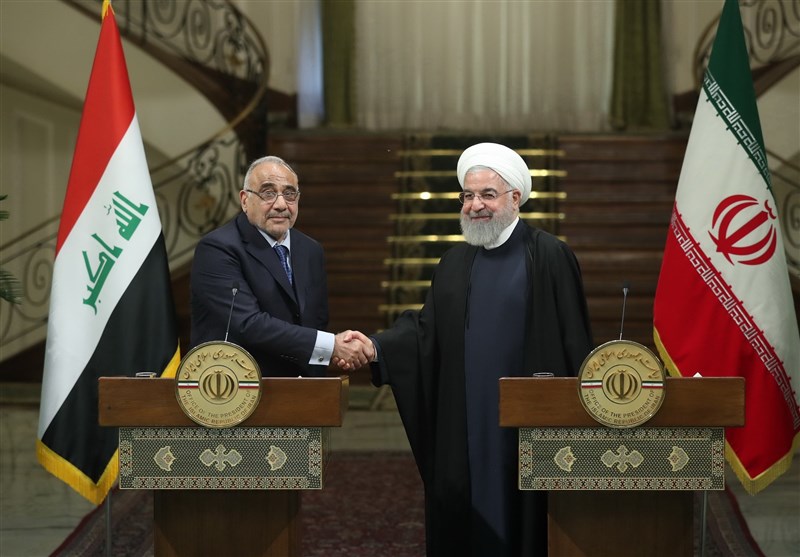
The historic alliance between Iraqi Prime Minister Adil Abdul-Mahdi and Iranian President Hassan Rohuani provides for a joint commitment to make the river navigable to ships with 12 tons, so as to allow easier access to oil tankers. The dredging operations amount to about 1000 billion rubles (about 15 billion dollars) and should be supported largely by Iraq which would strengthen with Iran its collaboration in the field of maritime traffic and consequently in that of the movement of Petroleum. “Arvand Dive begins after Ramadan,” said the Tasnim agency, but reported the news only in the Persian version. But it is evident that this agreement, signed in the most bitter moment of the US sanctions against Tehran and the consequent tensions,also brings Baghdad back into play on a war chess board. But also Syria itself.
SYRIA WITH US-BASED THREATS FROM ISRAEL
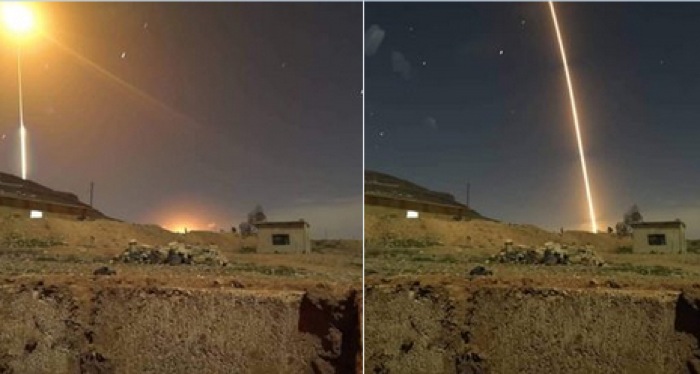
The crucial points in the geopolitical strategies are in fact the rich Syrian oil fields of Deir El Ezor, in the Euphrates valley which is the area of confines between Syria, reconquered by the government of Bashar Al Assad and Rojava, extension of Iraqi Kurditstan, firmly in the hands of US-backed Kurdish SDF-YPG militias. But so is the refugee camp of Al Rukban, controlled by the anti-Assad FSA rebels thanks to the support of the American military base in Al Tanf, on the border between Jordan, Syria and Iraq. These are the areas where 2,000 US troops have been deployed only in minimal part since the announcement of President Donald Trump in November. They represent two exceptional “bridgeheads” for any future US incursions into Iraqi territory.
But the subject of tensions in Syria was also the recognition by the White House of the Golan Plateau as the territory of Israel, in contrast to any UN resolution that considers that Syrian territory after the occupation of the Tel Aviv army in 1980. An additional argument in the hands of Israeli Prime Minister Benjamin Netanyahu to raise the level of clashes with Damascus, already the subject of repeated bombings with massacres of civilians and children for the simple fact that it houses positions of the Iranian Quds Forces and Lebanese Hezbollah, allies of Assad and of Russia in the war against Isis. And the commanders of the jihadists of the Islamic State, freed from Syria and Afghanistan and transported from the US to Iraq as reported by multiple sources,could represent a further strong point in the case of a conflict in Iraq.
In the event of a head-on collision between the US and Iran in the Persian Gulf, a threat to Baghdad is not to be excluded, but above all to Syria which could be the object of an attack by Israel: a strategy to extinguish the claims of Damascus for the future the Golan but also to keep Russia busy by distracting it from the Persian Gulf. In such a scenario of war on several fronts, the offensive against Venezuela could also start, from which the US economy depended heavily on cheap oil.
US IN CRISIS WITHOUT BLACK VENEZUELA GOLD
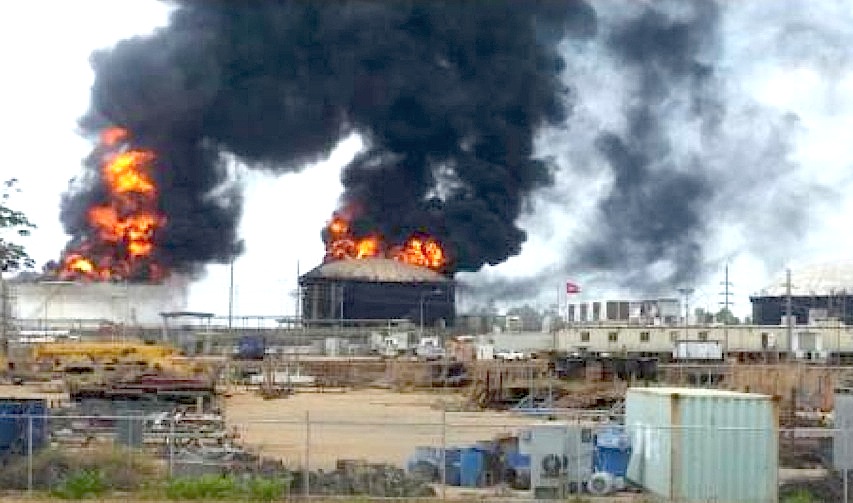
The raw black gold of the Orinoco valley, in fact, is very heavy and has high refining costs and this is why the United States imported it at low cost. With the stop of imports for the sanctions against the Venezuelan oil company Pdvsa (and its American subsidiary Citgo) the US market is certainly in shortage of supplies and is therefore forced to look elsewhere with an advantage over other importers: the growth of the cost of crude oil per barrel can make shale oil, the sisto oil, very competitive in extraction but very widespread throughout North America from the USA to Canada.This is why a possible escalation of the conflict in the Persian Gulf with skyrocketing increases in the price of black gold would be very negative for countries that have stable profitable supplies and markets such as Russia and Arab countries, but would not undermine the Americans to any extent increasingly strong alliance with the Saudis. For the US, the real economic threat is represented by the oil agreements signed by Russia with Venezuela but above all with Iran
RUSSIAN PETROLEUM PLATFORMS IN IRAN
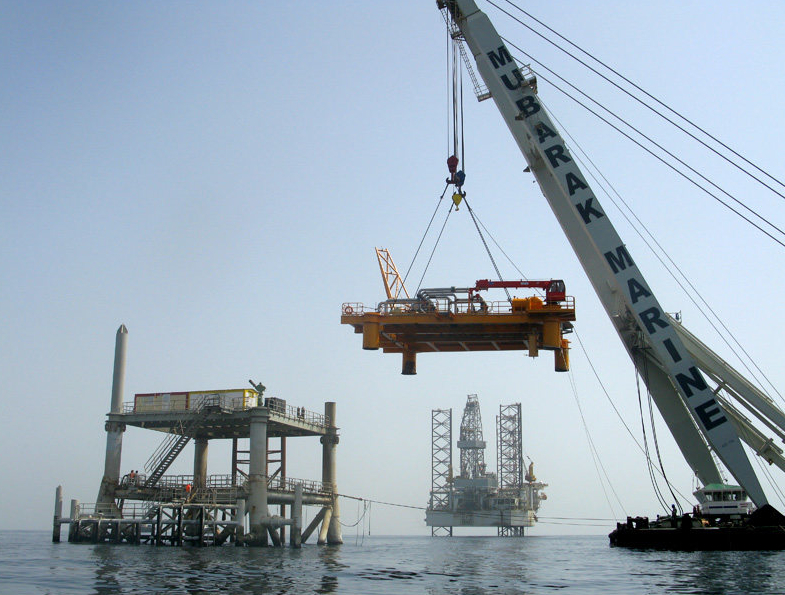
The Russian shipbuilding company Krasnye Barrikady and the Iranian company TODC have signed a $ 1 billion deal for the construction of five offshore platforms in the Persian Gulf. According to Ehsanollah Mousavi, CEO of TODC (Tasdid Offshore Development Company), the agreement provides for the construction of an offshore platform every two years off the Iranian port of Khorramshahr, located in the extreme south-west of Iran, on the mouth of the Arvand river (also called Shatt ul Arab). The platforms will be used for exploration of the Persian Gulf and the search for oil and gas fields;the project will be funded and implemented commonly by Iran and Russia and is important because it will transfer the know-how for the construction of off-shore platforms to the Islamic Republic of Iran, referring to Press TV in an article a few years ago.
“Under the agreements, the Iranians will contribute 58% in the construction of the first platform and this percentage will rise to 100% in the fifth platform – explained Mousavi – the signing of this agreement and the transfer of off-shore technology to the Iran is the fulfillment of a dream for the Middle Eastern nation ».the Iranians will contribute 58% in the construction of the first platform and this percentage will rise to 100% in the fifth platform – explained Mousavi – the signing of this agreement and the transfer of off-shore technology to Iran is the realization of a dream for the Middle Eastern nation ».the Iranians will contribute 58% in the construction of the first platform and this percentage will rise to 100% in the fifth platform – explained Mousavi – the signing of this agreement and the transfer of off-shore technology to Iran is the realization of a dream for the Middle Eastern nation ».
A dream that year after year has begun to materialize becoming for Washington the great nightmare: that of losing control of the oil with a devaluation of the dollar that in Shanghai has already been replaced by the PetroYuan in the negotiations and in Caracas an attempt has been made to expel it from the market with the PetroCoin.
The devaluation of the dollar would bring with it the collapse of the derivatives system, built artfully by the Federal Reserve bankers and based only on seigniorage thanks to the control of the currency. This is why the same American investment funds have invested a great deal in the arms market: so as to make the Third World War indispensable for the West if it were on the verge of exploding the speculative bubble. The attack on Iran could be the first step on this path to global hell: no return.
Fabio Giuseppe Carlo Carisio




No comments:
Post a Comment
Note: only a member of this blog may post a comment.